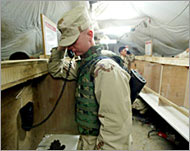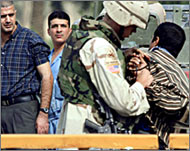Suicides dog US troops in Iraq
Of the more than 450 US fatalities since the beginning of the war in Iraq, 20 have reportedly been suicides, or “self-inflicted” deaths, as the military prefers to call them.

While officials at the Pentagon say they are looking at these cases seriously, there is no evidence yet to suggest that the stress, fatigue and uncertainty associated with combat environments such as Iraq contribute to an abnormally high rate of suicides, health experts say.
Even so, the United States Army considered the situation disturbing enough to send Lt Col Jerry Swanner, its suicide-prevention programme manager to Iraq in late September as part of a 12-person Mental Health Advisory Team.
The group was to study the effects of combat stress and extended deployments on US troops. Findings from the study are yet to be released.
Virginia Stephanakis, a spokeswoman for the Office of the Army Surgeon-General and the Army Medical Command, said the issue of military suicides in Iraq was a matter of concern, but it “was not the primary reason” the advisory team was dispatched.
Problem
“It’s always looked at as a problem,” Stephanakis said. “Even if it’s just one, it’s one too many.”
The precise number of troops who have taken their own lives has not even been determined, with some ambiguous cases still under review.
 |
|
Staying away from home for long |
“We have some deaths that we’re not sure what the problem was,” Stephanakis said.
Of the 20 individuals who have committed suicide thus far, 18 were army soldiers and two were Marines, according to representatives from each branch.
With roughly 130,000 US troops stationed in Iraq, there was a likelihood of at least a few suicides, said Dr Thomas Hicklin, an assistant professor of psychiatry at the University of Southern California School of Medicine.
“When you have a bunch of people you’re going to have some naturally-occurring suicides,” Hicklin said, adding that the current number of suicides in Iraq was in line with US suicide rates in the general population.
Difference
In fact, said Dr Carl Bell, a psychiatrist and suicide specialist at the University of Illinois-Chicago, “If you look at the suicide stats during any war, including Vietnam, and you look at civilian stats, there’s not a big difference.”
In addition to his academic duties, Hicklin is an Army colonel who was chief of a unit in Afghanistan that dealt with stress disorders among troops. Depression, he said, is the greatest contributing factor in suicide cases overall, the military included.
The fact that some troops stationed in combat zones such as Iraq or Afghanistan for long periods of time would suffer from depression is practically unavoidable, he added.
“There’s some naturally-occurring depression that people feel when they’re away from home and in an austere environment … plus they’re in the heat of the desert and there are some who are prone to depression,” he said.
An Army spokesperson told Aljazeera.net that, as of 8 December 601 soldiers had been medically evacuated from Iraq for behavioural health reasons.
Meanwhile, 42 soldiers had also been evacuated from Afghanistan for similar causes.
A soldier who enters a combat environment with an underlying emotional disorder could be more susceptible to the dangers of depression, Bell said.
 |
|
No simple relationship between |
“What you’ve got are people with the proclivity to be depressed,” he said. “You put them in a toxic situation like a war and their proclivity manifests.”
However, that does not necessarily indicate a causal relationship between war, depression and suicide, he said.
“The vast majority of [troops suffering from depression] will not commit suicide,” he said. “That’s the problem, it doesn’t work that way. Suicide is a very complex thing to study.”
Problems with personal relationships, unrelated to military service, are the most frequent cause of suicides in the Army in war and peacetime, said Martha Rudd, an Army spokeswoman.
Stress factor
“That’s overwhelmingly the most common cause, the trigger of suicides in the Army: the loss of a significant relationship,” Rudd said.
Most mental health experts dismissed the so-called stress factor.
Although the situation in Iraq is fraught with danger, unpredictability and high-stress activities for US troops, many of whom are serving longer tours of duty than were originally anticipated, Bell said stress did not not play a major role in military suicides.
“When soldiers are in the thick of a fight, they don’t have time to dwell on their problems” Martha Rudd, |
“The likelihood that what you’re getting is stress-induced is low and it’s low because the military has an extremely good handle on this kind of stuff,” he said.
Rudd said the Army tried to make sure that every soldier in the field had access to a chaplain or a psychiatrist if they needed one. One of the things the mental health team tried to assess in Iraq was “how the resources were distributed,” she said.
Ironically, Rudd said most of the suicides in Iraq occurred after 1 May, when President Bush announced the end of major combat operations, leading some to the conclusion that post-combat peacekeeping situations was when the troops were most at risk from killing themselves.
“When soldiers are in the thick of a fight, they don’t have time to dwell on their problems,” Rudd said.
Because the individual cases are still under review, neither the Army nor the Marine Corp are offering any details on the 20 reported instances of suicide in Iraq thus far.
But Bell said confusion about the circumstances was part of the problem for non-military experts trying to examine the situation.
“I don’t think we really have enough information about what’s going on over there to know what the hell is happening,” he said.